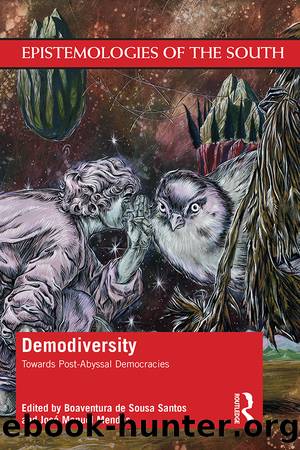Demodiversity: Toward Post-Abyssal Democracies by Boaventura de Sousa Santos José Manuel Mendes

Author:Boaventura de Sousa Santos, José Manuel Mendes [Boaventura de Sousa Santos, José Manuel Mendes]
Language: eng
Format: epub
ISBN: 9786079818524
Barnesnoble:
Publisher: Ediciones AKAL s.a.
Published: 2018-09-24T00:00:00+00:00
The Irreconcilable Difficulties of Political Change: Against the Waste of Experience
Starting from the same conclusion â that there is not a unique subject for social transformation and, much less, one that can postulate its existence on the basis of an essentialist universalism like that noted by mechanistic Marxism â the question about the construction of a political identity able to act as a vehicle of legitimacy is a question in need of resolving when evaluating the possibility for social transformation. It is clear that the construction of an identity passes through a discourse that has the performative ability to put all the social demands on the same side of the divide between inclusion and exclusion and to convert this exclusion into antagonism. In Laclau (2005), the emptying of the signifier that will become hegemonic â an emptying that is necessary to allow a string of equivalences, and which otherwise could not satisfy all the requirements â implies a partial lameness of the particular demands. And this lameness, in addition to small flaws on the road to finding a common minimum on which to build a we and a they, eventually weakens the struggles and undermines the efforts. It would be, in the words of Boaventura de Sousa Santos, a âwaste of experienceâ (2004). In Laclau, as with populist proposals whether of the right or emancipatory, the process that adds specific requirements in order to build an identity that contains the possibility of transformation is vertical; part of the concrete requirements for the empty signifier which adds to the whole. It is a given prerequisite that the populist leadership has the capacity to become hegemonic which defines the political identity, something that has already been determined or that will be defined by its own leadership. The risk of wasting the experience, as we have seen, is very high. Establishing the construction of the subject people based on strong discourse takes Gramsci in the wrong direction, by separating the construction of the hegemony from revolution and from struggle, turning it into a mere electoral tactic that cannot build a new subject because it fails to confront the new identity with whatever material reality goes beyond the feeling of having seen a demand rejected that has not been elaborated on in depth. The strategic hegemonic moment obviously has to rely on the correlation of social forces and must face the rebel reality that hampers emancipation. However, in the same way that there is no mechanical explanation between the structure and superstructure, one cannot postulate the absence of an objective structural base that makes the discourse fully autonomous (Dal Maso, 2016).
It is precisely this difficulty in defining and controlling identity from discourse that leads to the militarizing of the populist political organizations through unifying, theoretically, definitions and halting any dissent. What is thus considered reasonable or sensible â making sacrifices in the name of the interests of the majority to facilitate its subsequent defence by building a new historical bloc â has paved the
Download
This site does not store any files on its server. We only index and link to content provided by other sites. Please contact the content providers to delete copyright contents if any and email us, we'll remove relevant links or contents immediately.
Nudge - Improving Decisions about Health, Wealth, and Happiness by Thaler Sunstein(7693)
The Fire Next Time by James Baldwin(5431)
iGen by Jean M. Twenge(5409)
Adulting by Kelly Williams Brown(4566)
The Sports Rules Book by Human Kinetics(4379)
The Hacking of the American Mind by Robert H. Lustig(4375)
The Ethical Slut by Janet W. Hardy(4242)
Captivate by Vanessa Van Edwards(3838)
Mummy Knew by Lisa James(3686)
In a Sunburned Country by Bill Bryson(3537)
The Worm at the Core by Sheldon Solomon(3486)
Ants Among Elephants by Sujatha Gidla(3463)
The 48 laws of power by Robert Greene & Joost Elffers(3251)
Suicide: A Study in Sociology by Emile Durkheim(3019)
The Slow Fix: Solve Problems, Work Smarter, and Live Better In a World Addicted to Speed by Carl Honore(3007)
The Tipping Point by Malcolm Gladwell(2914)
Humans of New York by Brandon Stanton(2868)
Handbook of Forensic Sociology and Psychology by Stephen J. Morewitz & Mark L. Goldstein(2704)
The Happy Hooker by Xaviera Hollander(2686)
